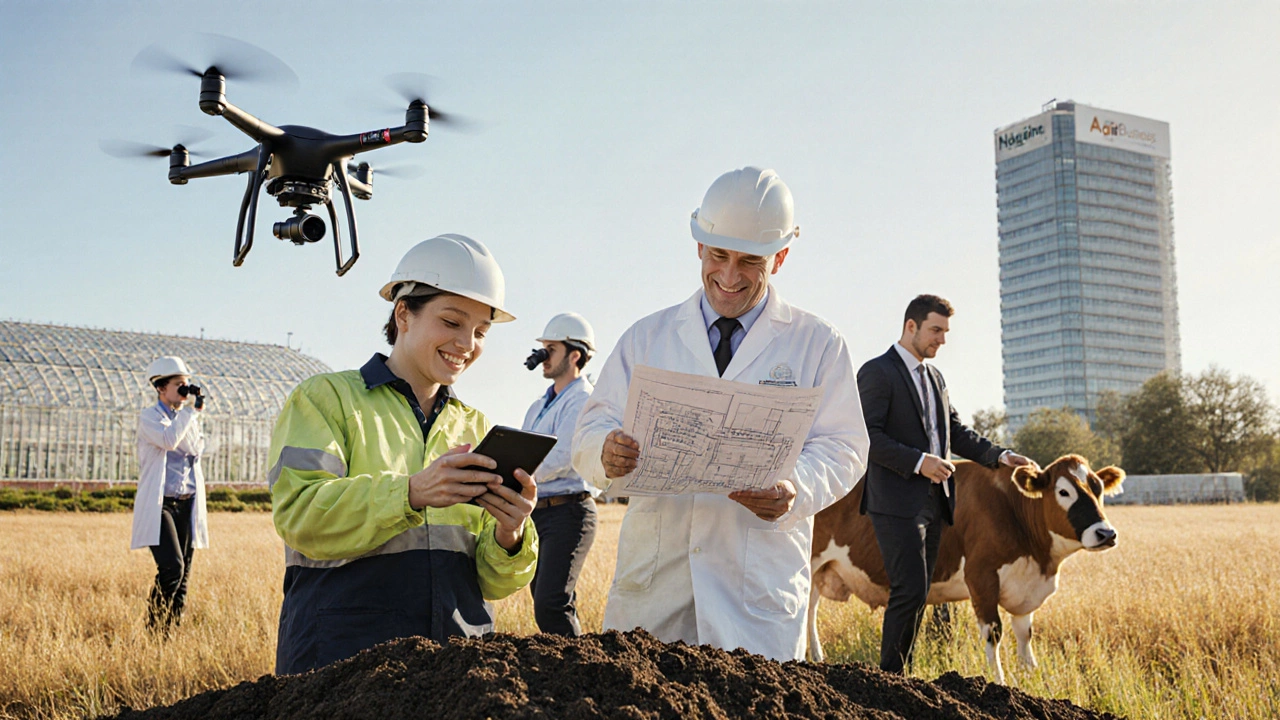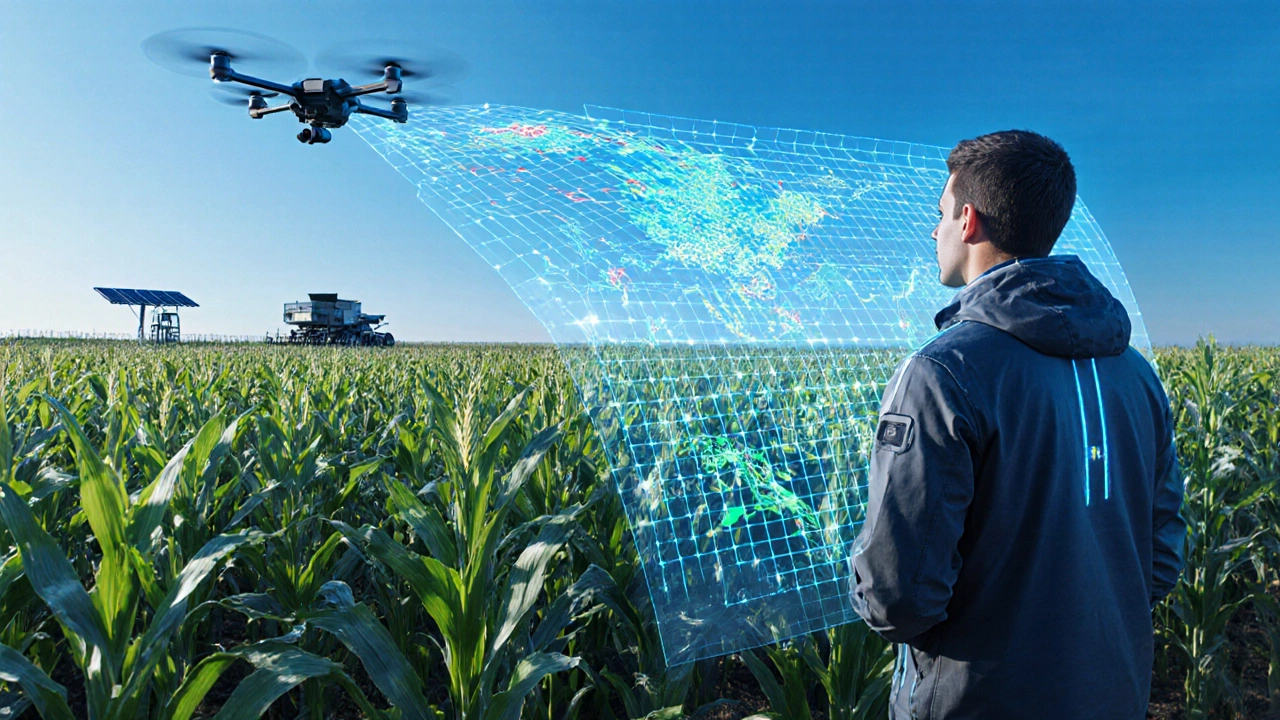What jobs fall under agriculture? - Comprehensive guide to agricultural careers
 Oct, 23 2025
Oct, 23 2025
Agricultural Career Finder
Find your perfect agricultural career match
Answer a few questions about your interests, skills, and preferences to discover which agricultural careers align with your strengths. This tool is based on the comprehensive guide to agricultural careers.
1. What work environment do you prefer?
2. What type of work interests you most?
3. What level of education are you pursuing?
4. What's your biggest priority in a career?
Your Agricultural Career Matches
Agricultural jobs are the many occupations that keep our food, fiber, and bio‑energy systems running. From planting seeds to analyzing market trends, the sector offers a wide range of roles for people with different skills and interests. This guide breaks down the main job families, details the duties, required education, salary outlook, and shows where the fastest‑growing opportunities lie.
Key takeaways
- Agriculture employs over 1 billion people worldwide, spanning production, technology, business, and research.
- Core job families include Production, Technical, Business & Management, Science & Research, and Emerging Tech.
- Typical entry points are vocational training, associate degrees, or bachelor’s programs in agri‑sciences.
- Precision agriculture and sustainability roles are expanding fastest, with salaries 15‑30 % above traditional farm positions.
- Use the checklist below to match your interests with the right agricultural career path.
Whether you grew up on a farm or are just curious about a stable, purpose‑driven career, understanding the landscape of agricultural jobs helps you make an informed choice.
1. Production‑focused roles
These jobs are at the front line of growing crops, raising livestock, or managing fisheries. They require hands‑on skills and an eye for seasonal cycles.
Agronomist
- What they do: Advise on soil health, pest management, and crop rotation to maximize yields.
- Typical education: B.S. in Agronomy, Plant Science, or related field; certifications from the American Society of Agronomy are a plus.
- Average salary (2025 US): $70,000 - $95,000 per year.
- Job outlook: 9 % growth over the next decade due to rising demand for sustainable intensification.
Farm Manager
- What they do: Oversee daily farm operations, manage labor, budgeting, equipment, and compliance.
- Typical education: Associate’s degree in Agricultural Management or extensive on‑the‑job experience.
- Average salary: $55,000 - $85,000.
- Job outlook: Stable, with modest growth as farms adopt more technology.
Livestock Specialist
- Focuses on animal health, breeding programs, nutrition, and welfare.
- Often requires a degree in Animal Science or veterinary background.
- Salary range: $50,000 - $80,000.
2. Technical & engineering roles
Technology is reshaping how farms operate. Engineers and technicians design, install, and maintain equipment that boosts efficiency and reduces waste.
Agricultural Engineer
- What they do: Develop irrigation systems, farm machinery, post‑harvest processing equipment, and renewable energy solutions for farms.
- Typical education: B.S. in Agricultural Engineering; professional licensure (PE) optional.
- Average salary: $78,000 - $110,000.
- Job outlook: 12 % growth, driven by automation and climate‑resilient infrastructure.
Precision Agriculture Specialist
- Uses GPS, drones, and IoT sensors to create site‑specific management plans.
- Degree in Agronomy, GIS, or Computer Science with an agriculture focus.
- Salary: $85,000 - $115,000, often higher in large‑scale commodity farms.
Agricultural Technician
- Maintains equipment, conducts soil and water testing, and supports research trials.
- Typically holds a certificate or associate’s degree in Agri‑technology.
- Salary: $40,000 - $55,000.
3. Business, management & policy roles
These positions turn raw agricultural output into marketable products, manage supply chains, and shape policies that affect the entire sector.
Agricultural Economist
- Analyzes market trends, commodity pricing, and policy impacts on farm profitability.
- Master’s in Agricultural Economics or Development Economics.
- Salary: $70,000 - $100,000.
Agribusiness Analyst
- Works for food companies, cooperatives, or agritech startups to evaluate investment opportunities.
- Business or finance degree with agri‑focus.
- Salary: $75,000 - $120,000.
Extension Officer
- Provides education and resources to farmers, bridging research and practice.
- Usually holds a graduate degree in a relevant science and a certification from the Cooperative Extension System.
- Salary: $50,000 - $70,000.

4. Science, research & development roles
Innovation in crop genetics, pest control, and nutrition originates in labs and experimental farms.
Horticulturist
- Specializes in growing fruits, vegetables, ornamental plants, and managing greenhouses.
- B.S. in Horticulture; many hold a Master’s for research positions.
- Salary: $55,000 - $80,000.
Food Scientist
- Develops new food products, improves safety, and works on shelf‑life extension.
- Degree in Food Science, Chemistry, or Nutrition.
- Salary: $70,000 - $98,000.
Plant Breeder / Geneticist
- Creates new crop varieties with higher yield, disease resistance, or climate tolerance.
- Ph.D. in Plant Genetics or Molecular Biology.
- Salary: $90,000 - $130,000.
5. Emerging technology and sustainability roles
Climate change and digital transformation have birthed new specialties that blend ecology, data, and entrepreneurship.
Climate‑Smart Agriculture Coordinator
- Designs practices that reduce greenhouse‑gas emissions, improve water use, and increase carbon sequestration.
- Background in environmental science plus agriculture.
- Salary: $65,000 - $90,000.
Agri‑Tech Startup Founder
- Builds platforms for farm management software, biotech solutions, or marketplace apps.
- Often a mix of business acumen, coding skills, and industry know‑how.
- Compensation varies widely; equity is common.
Data Analyst - Agriculture
- Turns sensor data into actionable insights for yield prediction and input optimization.
- Degree in Data Science, Statistics, or Computer Science with agronomy electives.
- Salary: $80,000 - $115,000.
6. How to start a career in agriculture
Breaking into the sector can follow several routes, depending on the role you target.
- Identify your interest area: Production vs. tech vs. business.
- Choose education pathway:
- High‑school agriculture programs or FFA clubs for early exposure.
- Community college certificates (e.g., Agri‑mechanics, Soil Testing).
- Bachelor’s degrees in Agronomy, Agricultural Business, Animal Science, or Agri‑Engineering.
- Graduate degrees for research, economics, or policy roles.
- Gain practical experience: Internships on farms, research labs, or agribusiness firms.
- Get certified: Certifications from the American Society of Agricultural and Biological Engineers (ASABE), Certified Crop Adviser (CCA), or Soil Health Specialist.
- Network: Attend conferences like the World Agri‑Tech Expo, join professional societies, and use LinkedIn groups.

7. Salary & job outlook snapshot
| Job Title | Median Salary | Growth % (2025‑2035) |
|---|---|---|
| Agronomist | $82,000 | 9 |
| Agricultural Engineer | $94,000 | 12 |
| Farm Manager | $70,000 | 5 |
| Precision Ag Specialist | $100,000 | 18 |
| Agricultural Economist | $85,000 | 8 |
| Horticulturist | $68,000 | 7 |
| Food Scientist | $84,000 | 10 |
| Data Analyst - Agriculture | $97,000 | 15 |
8. Quick checklist for choosing your agri‑career path
- Do you prefer outdoor work or a lab/office setting?
- Are you comfortable with technology and data analysis?
- What level of education are you willing to pursue?
- Do you aim for a role with direct impact on food security or a corporate/consulting focus?
- Consider regional demand - some states have higher needs for livestock specialists, others for precision ag tech.
Frequently Asked Questions
What is the difference between an agronomist and a horticulturist?
An agronomist focuses on large‑scale field crops like corn, wheat, and soybeans, optimizing soil health and yield. A horticulturist works with fruits, vegetables, ornamental plants, and often operates in greenhouses or nurseries. Both study plant biology, but their target crops and environments differ.
Do I need a college degree to become a farm manager?
Many farm managers start with hands‑on experience, especially on family farms. However, an associate’s degree in agricultural management or business can speed up career progression and open doors to larger commercial operations.
Which agricultural jobs are growing the fastest?
Roles that blend data, technology, and sustainability-like Precision Agriculture Specialists, Climate‑Smart Agriculture Coordinators, and Agricultural Data Analysts-are seeing the highest growth rates, often above 15 % annually.
Can I work in agriculture without living in a rural area?
Yes. Many tech‑focused jobs (e.g., agri‑tech startup founder, data analyst, policy advisor) are based in cities. Even extension officers and consultants can serve multiple regions from a central office, using virtual tools to reach farmers.
What certifications boost my credibility in agriculture?
Key certifications include Certified Crop Adviser (CCA), Soil Health Specialist, Professional Engineer (PE) for agricultural engineers, and various ASABE certifications for equipment design.
Exploring the breadth of agricultural jobs shows that the sector isn’t just about tractors and fields-it’s a high‑tech, research‑driven, business‑savvy arena with room for almost any skill set. Use the information above to map your interests, plan your education, and launch a rewarding career that feeds the world.